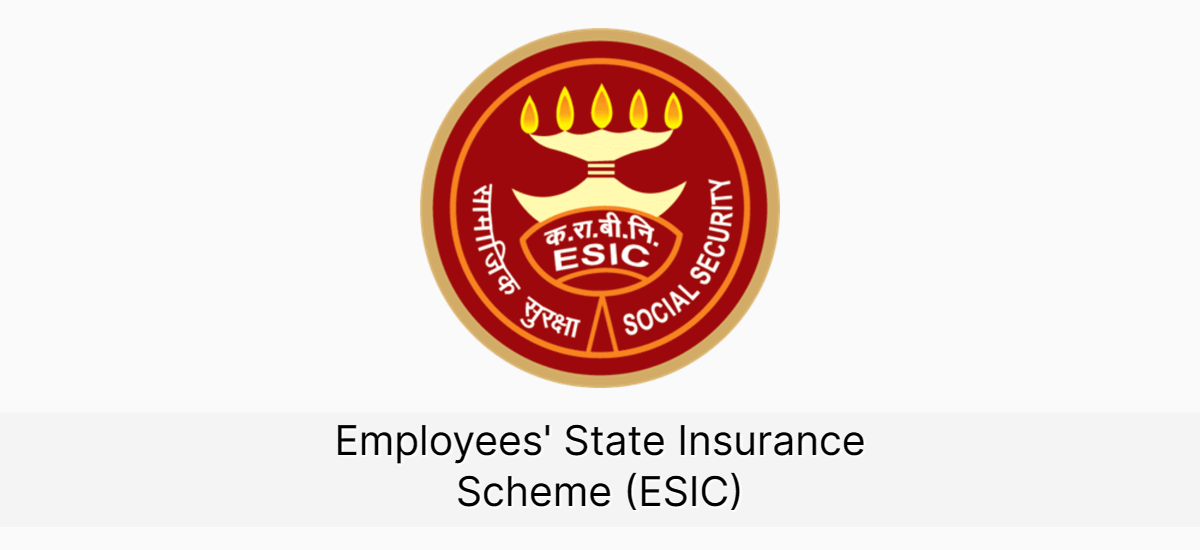About Employees State Insurance (ESI) Scheme
- It is a social security scheme offered by the Government of India as per the Employees’ State Insurance Act, 1948.
- It is administered by a statutory corporate body called the Employees’ State Insurance Corporation (ESIC)
- The scheme provides protection to employees against disablement/death due to employment injury, sickness, and maternity.
- Applicability:
- The ESI Scheme applies to factories and other establishment’s viz. Road Transport, Hotels, Restaurants, Cinemas, Newspaper, Shops, and Educational/Medical Institutions wherein 10 or more persons are employed.
- However, in some States threshold limit for coverage of establishments is still 20.
- It is the employer’s legal responsibility to register their factory/ establishment under the ESI Act within 15 days of its applicability to them.
- Wage Limit:
- The existing wage limit for coverage under the Act is Rs.21,000/- per month (Rs.25000/- per month in the case of Persons with Disability).
- It is the employer’s responsibility to enroll eligible employees in the ESI program.
- How are contributions made?
- This is a self-financing scheme, where the employees and the employers make regular monthly contributions to the scheme at a certain percentage of their wages.
- As of now, covered employees contribute 0.75% of the wages, whereas the employers contribute 3.25% of the wages, payable to their employees.
- Employees earning less than Rs. 137/- a day as daily wages are exempted from payment of their share of contribution.
- The State Governments, as per provisions of the Act, contribute 1/8th of the expenditure of medical benefits within a per capita ceiling of Rs. 1500/- per Insured Person per annum.
- The main benefits provided under ESI Scheme are:
- Sickness Benefit: During medical leave, the scheme offers cash flow during the said period. The worker can avail 70% of the daily wage for a maximum of 91 days. This can be availed in two consecutive periods.
- Disablement Benefit: In case of temporary disablement of the worker, they are eligible for a monthly wage of 90% until they recover. In the case of permanent disability, 90% of the monthly wage can be availed for the entire life.
- Dependants’ Benefit: Paid at the rate of 90% of wage in the form of monthly payment to the dependants of a deceased Insured person in cases where death occurs due to employment injury or occupational hazards.
- Maternity Benefit: The beneficiary can avail 100% of the daily wages for up to 26 weeks, which can be extended to a further one month based on the medical advice. In the case of miscarriage, the benefit is 6 weeks, while in the case of adoption it is 12 weeks.
- Medical Benefit: Under the scheme, the insured’s medical expenses are covered through affordable and reasonable healthcare facilities.
- Besides the above, other benefits being provided to the beneficiaries are Confinement Expenses, Funeral Expenses, Vocational Rehabilitation, Physical Rehabilitation, Unemployment Allowance (RGSKY) and Skill Upgradation Training.
- Employee’s insurance number remains the same as long as he or she remains within the ESIC wage limit. Changing jobs will not affect an employee’s insurance status, and his or her insurance number will remain the same.
Q1) What is the Rajiv Gandhi Shramik Kalyan Yojana (RGSKY)?
The Rajiv Gandhi Shramik Kalyan Yojana (RGSKY) introduced by the Employees’ State Insurance Corporation (ESIC) w.e.f. 01.04.2005 provides unemployment allowance to the Insured Person (IP). This allowance is given for not more than 24 months, that is, two years, in case the IP is rendered jobless involuntarily because of retrenchment as defined under the Industrial Disputes Act, 1947.
Last updated on August, 2025
→ UPSC Mains Admit Card 2025 will be released soon at www.upsc.gov.in.
→ UPSC Mains 2025 will be conducted on 22nd August 2025.
→ UPSC Notification 2025 was released on 22nd January 2025.
→ UPSC Calendar 2026 is released on 15th May, 2025.
→ UPSC Prelims Question Paper 2025 and Unofficial Prelims Answer Key 2025 are available now.
→ UPSC Prelims Result 2025 is out now for the CSE held on 25 May 2025.
→ The UPSC Vacancy 2025 were released 1129, out of which 979 were for UPSC CSE and remaining 150 are for UPSC IFoS.
→ UPSC Prelims 2026 will be conducted on 24th May, 2026 & UPSC Mains 2026 will be conducted on 21st August 2026.
→ The UPSC Selection Process is of 3 stages-Prelims, Mains and Interview.
→ UPSC Result 2024 is released with latest UPSC Marksheet 2024. Check Now!
→ UPSC Toppers List 2024 is released now. Shakti Dubey is UPSC AIR 1 2024 Topper.
→ Also check Best IAS Coaching in Delhi















